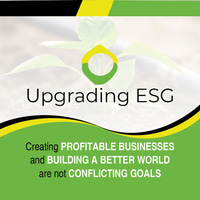Earth Day 5783
Environmental Responsibility, Limits and Ethics.
On Earth Day 5783, I want to share some inspirational writings of the late Lord Jonathan Saacks. What is interesting are his insights from the Bible.
The headline to describe this is very applicable. We are in need of education and further learning about – overconsumption, waste and a rethink of capitalism. There is a war on ESG, which does not make sense. What is missing from ESG, one could argue, is Ethics (and God)
So, let’s dive deep into some of these teachings which are available as a resource for education and further learning.
https://www.rabbisacks.org/teaching-resources/environmentalism/
Discussion Questions
· What are the biggest challenges facing humanity today?
· Who is to blame for them?
· Is this important? Why does it matter?
· Who is responsible for addressing these challenges?
· What does Judaism say about this?
· Can Judaism’s ancient texts and wisdom help address current challenges? How?
Environmental Limits
“God sets limits to the enjoyment of nature. There is a tree from which man may not eat. Man ignores the restriction, eats from the fruit of the tree, and as a result suffers exile from Eden. Nature turns against him: ‘Cursed shall be the ground because of you; by toil shall you eat of it all the days of your life; thorns and thistles it shall sprout for you.’ Today we are right to read this as an ecological parable. Once we lose the idea of limits and focus instead on short-term enjoyment, we set in motion long-term disharmonies which have devastating effects on the human situation. Man must not abuse nature for he is part of nature: ‘Dust you are and to dust you will return.
Bereishit sets forth a view of nature which is not man-centered but God-centred. To be sure, humanity with its unique capacity for moral choice is the focus of its concerns. But Maimonides warns us against an anthropocentric view of reality. ‘The universe does not exist for man’s sake, but each being exists for its own sake and not because of some other thing (Rambam’s Guide of the Perplexed, 3:13). The climax of the book of Job, as God speaks to Job from the whirlwind, is a magnificent poem on this theme: the hubris of believing that man can subject the universe to his comprehension and control. Not only can he not tame Leviathan. Even the most harnessed of animals, the donkey, has an existence independent of man.”
Faith in the Future, p. 208
Environmental Responsibility- Sustainability
We hear a lot about sustainability. But what does the word sustainability mean?
Quoting rabbi Sacks “We are charged with conserving and protecting the world’s resources so that future generations would benefit – a point brought out by a simple Talmudic story about one of the saints of early rabbinic times, Honi the Circle-Drawer:
One day Honi was journeying on the road and saw a man planting a carob tree. He asked him, ‘How long does it take for a carob tree to bear fruit?’ The man replied, ‘Seventy years.’ Honi asked, ‘Are you certain that you will live another seventy years?’ The man answered, ‘I found carob trees in the world. As my forefathers planted them for me, so I too plant these for my children.’ (Ta’anit 23a)”
A failure to observe those limits causes humans beings to be exiled from their own garden of Eden. We have been aware of threats to the environment and the dangers of climate change for a long time, certainly since the 1970s. Yet the measures humanity has taken to establish limits on consumption, pollution, the destruction of habitats, and the like have, for been too little, too late. A 2019 BBC survey of moral attitudes in Britain showed that despite the fact that a majority of people felt responsibility for the future of the planet, this had not translated into action. Seventy-one per cent of people thought that it is acceptable to drive when it would be just as easy to walk. Sixty-five per cent of people thought it acceptable to use disposable cutlery and plates." most part,
In The True and Only Heaven, Christopher Lasch argued that the scientific revolution and the Enlightenment endowed us with the belief that there are no limits, that science and technology will solve every problem they create, and the earth will continue indefinitely to yield its bounty. "Progressive optimism rests, at bottom, on a denial of the natural limits on human power and freedom, and it cannot survive for very long in a world in which an awareness of those limits has become inescapable." Forget limits and eventually, we lose paradise. That is what the story of Adam and Eve warns.”
And that is why we need to contemplate Environmental Responsibility, Limits and Ethics if we are going to make a change.
